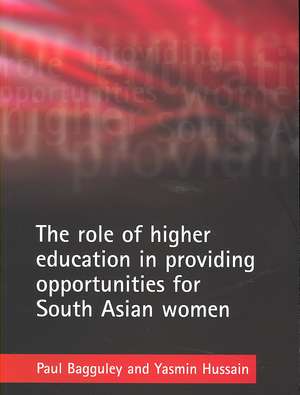The role of higher education in providing opportunities for South Asian women
Autor Paul Bagguley, Yasmin Hussainen Limba Engleză Paperback – 29 apr 2007
Although South Asian women are one of the most socially excluded groups in the UK, their numbers at university have increased rapidly in recent years. This report seeks to understand why they are entering university in larger numbers and the impact of this on their lives."The role of higher education in providing opportunities for South Asian women" explores the experiences of Bangladeshi, Indian and Pakistani women at university. It considers the role of families in shaping choices about local universities and which A-levels and degree subjects to study; [vbTab]how community expectations about marriage interact with plans for university; the financial strategies of South Asian women students for funding their education; experiences of racism and Islamophobia inside and outside education and the diversity of the experiences of education among South Asian women, in terms of class, ethnicity and religion.The report is aimed at policy communities and academics with an interest in education, ethnicity and gender. It contains new findings relevant to diversity, equality and widening participation in universities.
Preț: 181.00 lei
Nou
Puncte Express: 272
Preț estimativ în valută:
34.63€ • 36.25$ • 28.83£
34.63€ • 36.25$ • 28.83£
Carte indisponibilă temporar
Doresc să fiu notificat când acest titlu va fi disponibil:
Se trimite...
Preluare comenzi: 021 569.72.76
Specificații
ISBN-13: 9781861349736
ISBN-10: 1861349734
Pagini: 72
Dimensiuni: 210 x 295 x 5 mm
Greutate: 0 kg
Ediția:New.
Editura: Bristol University Press
Colecția Policy Press
ISBN-10: 1861349734
Pagini: 72
Dimensiuni: 210 x 295 x 5 mm
Greutate: 0 kg
Ediția:New.
Editura: Bristol University Press
Colecția Policy Press
Notă biografică
Paul Bagguley, School of Sociology and Social Policy, University of Leeds and Yasmin Hussain, School of Social Policy and Sociology, University of Leeds
Cuprins
Introduction
The context
Deciding to go to University
On being pioneers: experiences of University and beyond
South Asian Women: widening participation and careers
Conclusions: Issues for policy, practice and future research
The context
Deciding to go to University
On being pioneers: experiences of University and beyond
South Asian Women: widening participation and careers
Conclusions: Issues for policy, practice and future research
